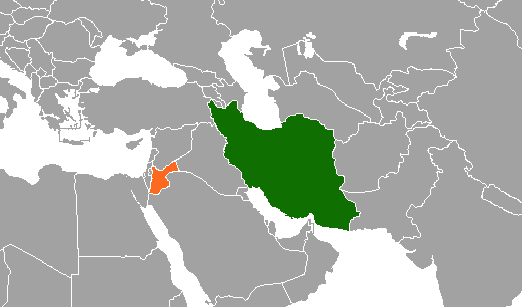 Iran (green) and Jordan (orange).
Iran (green) and Jordan (orange).
Iranian Influence in Jordan
On May 15, Reuters reported that Jordan had foiled an Iranian-led attempt to smuggle weapons into the kingdom back in March. The aim of the plot was to assist opponents of the Jordanian government in carrying out acts of sabotage inside the country. Jordanian sources told Reuters that its security services have “thwarted numerous attempts by Iran and its allied groups to smuggle in arms including Claymore mines, C4 and Semtex explosives, Kalashnikov rifles and 107mm Katyusha rockets.” The Kingdom of Jordan is a close ally of the United States and is designated a U.S. Major Non-NATO Ally. Due to its relationship with the United States, and its peace treaty with Israel, some believe that Jordan is in Iran’s crosshairs. Mass protests in Jordan caused by the war in Gaza have only raised concerns that the kingdom, long regarded as a beacon of stability, may be susceptible to Iranian influence.
Iran has three main goals: export its ideology of revolutionary Islam across the Middle East, oust the U.S. from the region, and destroy the State of Israel. To achieve this, Iran has masterminded a network of proxies to do its bidding, affording it considerable influence in Iraq, Syria, Lebanon, and Yemen. Jordan could be Iran’s next target as Jordanians grow increasingly disillusioned with their government’s relationship to Israel. In fact, some Jordanian government officials and journalists believe that the protests are being incited by Hamas and the Muslim Brotherhood in coordination with Iran.
Saudi journalist Tariq Al-Homayed believes that Iran seeks to destabilize Jordan in order to “extend its supply lines from Iran to the Mediterranean through Iraq, Jordan, and Syria, and to ensure that the regime in Damascus is covered from behind” as well as grant it “a foothold on the Saudi and Egyptian borders.” The International Institute for Iranian Studies, a Saudi Arabia-based think tank, argues that Iran’s interest in Jordan is part of a “broader strategy to encircle Israel, assert Tehran’s influence in regional affairs, and undermine other regional actors in favor of Iran.”
Last month—in a direct challenge to the Jordanian government—Kata’ib Hezbollah, an Iranian proxy in Iraq, threatened to arm 12,000 Jordanian militants with “light and medium weapons, anti-armor launchers, tactical missiles, ammunition, and tons of explosives.” Iran and its proxies have extensive experience smuggling arms through Jordan to the West Bank, and it now appears that smuggled weapons could be used in Jordanian territory to destabilize the monarchy.
Iranian proxies have repeatedly violated Jordan’s sovereignty, including in a January drone attack that killed three U.S. soldiers. Iran also directly violated Jordan’s airspace when it carried out an unprecedented missile and drone attack on Israel in April.
Iranian proxies have also been undermining Jordan’s security by smuggling drugs across its borders, resulting in clashes with the Jordanian military. In 2022, King Abdullah II publicly condemned the “regular attacks on [Jordan’s] borders by militias linked to Iran.” Iranian-linked drug trafficking operations are straining Jordan’s security and law enforcement resources while simultaneously financing Iran’s malign activities.
In spite of all this, there is no cause for alarm at the moment, according to Ghaith Al-Omari, who previously served in various positions in the Palestinian Authority. Al-Omari points out that the Jordanian public is strongly opposed to Iran. Anti-Iranian sentiment stems from Jordan’s conservative Sunni traditions and as well Iran’s assistance to Syria during its brutal civil war. Additionally, the International Institute for Iranian Studies offers reassurance that Jordan’s “robust state structure, reinforced by its monarchy with deep-rooted customs and traditions, serves as a bulwark against destabilizing influences.” Still, Iran plays the long game, and the possibility for greater Iranian influence in Jordan should not be ignored.
An Iranian-aligned entity in Jordan would severely harm U.S. national security interests and Middle Eastern security writ large. The weakening of Jordan’s monarchy—or its complete collapse—could create a power vacuum with consequences extending far beyond its borders. At the very least, it would be an incredibly damaging blow to years of U.S. efforts to normalize relations between Israel and the Arab world.
Image Credit: “Iran Jordan Locator” by ZaDoraemonzu is licensed under CC BY-SA 4.0.





